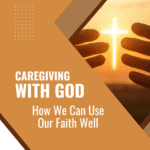
There are many intersections between faith and caregiving. Certainly, providing care can be an act of giving and faith, the type of gift we are called to give in the Bible. Plus, many caregivers are strong Christians. Their faith is a core part of who they are (even if it feels a bit shaky at times).
Some people would even say that they are caregiving with God. That they are being supported and strengthened by him every step of the way.
I felt that way myself in many parts of my caregiving journey. I also felt a lot of despair. There were plenty of moments where I felt completely abandoned. Where it seemed like too much was being asked of me and I couldn’t handle it.
Both perspectives are valid. They’re a part of being human.
But, how do we cope with them? What does caregiving with God actually look like? How do you do it wisely and well?
Some Christians have a type of knee-jerk response to this question, where they double down on the idea of trusting God, of relying on his strength, and allowing him to lift you up.
Doing so is important. Of course it is. However, that’s not our main focus here.
I’m betting that you already know how to lean into God. How to trust him. You may also be finding that it just isn’t working.
Perhaps you’re blaming yourself, thinking that you should be able to do better.
Please don’t (easier said than done, I know). You’re just a human and you’re already giving this journey everything you possibly can. God provides grace for us.
There are also other things to consider.
The Principles of Caregiving with God
Many Bible verses talk about serving God and others. About loving others as yourself, honoring your parents, and being kind to one another.
This much will already be familiar.
What’s easier to miss is that we’re generally not called to sacrifice all we are to support one person. And, you should still be caring for yourself. Doing this isn’t selfish and isn’t un-Christian
Love Others as Yourself
One indication of this is the famous verses Mark 12:30-31, which in the NIV read:
30 Love the Lord your God with all your heart and with all your soul and with all your mind and with all your strength.’ 31 The second is this: ‘Love your neighbor as yourself.’ There is no commandment greater than these.
Mark 12:30-31
Your neighbor is anyone, that much we all know.
What’s interesting is that little word as. Love your neighbor as yourself.
This implies that you’re meant to love yourself too. And, presumably, care for yourself.
Care for Yourself
Similarly, there are times in the New Testament when Jesus tells his disciples to rest, like Mark 6:31-32.
31 Then, because so many people were coming and going that they did not even have a chance to eat, he said to them, “Come with me by yourselves to a quiet place and get some rest.” 32 So they went away by themselves in a boat to a solitary place.
Mark 6:31-32
That happened while there were still many people coming and going. In the same way, Luke 5:16 tells us that Jesus regularly withdrew into the wilderness to pray, even when large crowds had gathered.
From those verses alone, it’s clear that resting is essential, as is meeting our own needs. And these are just a few examples.
Also remember that most of the verses about supporting and loving other people are quite general. They focus on broad strokes, so you must use discernment when applying them to your own life.
In particular, be careful about applying these concepts too rigorously. Make sure you have plenty of time and energy left for yourself.
Keep Within Your Responsibilities
One of the biggest ways of caregiving with God is to give gladly when it is your responsibility to do so – and to step back when it is someone else’s responsibility.
In their Boundaries book, Drs. Cloud and Townsend make a fantastic distinction around this topic.
They talk about how Galatians 6:2 says that we should carry burdens for each other, while Galatians 6:5 talks about how each person should carry their own load.
(the exact words and phrasing varies from translation to translation, but the sentiment is similar. For example, the New International Readers Version translates this as heavy loads versus loads).
When Cloud and Townsend talk about this, they define burdens as being excessive, extremely heavy, and something that people cannot carry on their own.
Load, on the other hand, refers to the regular challenges of life. The work we all need to do. Our loads aren’t always pleasant and sometimes we don’t want to carry them, but they’re ours to take care of.
As caregivers, our responsibility is to help those we’re supporting with their burdens, not their loads.
This often means paying attention to what our aging parents actually need, rather than what they want. Sometimes we even need to practice tough love to make sure we’re supporting our parents without enabling them.
Practical Steps You Can Take
1. Learn to Care For Yourself
Self-care has always been an essential part of caregiving. It’s also an arena that caregivers regularly struggle with.
It’s hard, isn’t it?
How do you prioritize yourself when the person you’re with needs so much more?
Christians sometimes find this area even more difficult. There’s often a sense of guilt – because it feels like you should be focusing on the other person.
But, as we highlighted before, we’re not commanded to sacrifice ourselves – especially not for wants that a person can meet themselves.
Here are a few tips and links that can get you started.
- Pay close attention to the senior’s wants versus needs and start distinguishing between the two.
- Focus on small types of self-care. Five or ten minutes here and there mightn’t seem like it does much, but the benefits add up across your day and week.
- Look at what you actually need and use this as a starting point. Do you need predictability? Variety? Rest? Excitement? Connection? Identifying your needs in the moment is a crucial part of supporting yourself well.
- Be proactive. As we discuss in our capacity model, it’s best to meet your needs gently long before they become critical. This way you have the resilience to cope with any sudden change that knocks things off track.
- Remember that you’re not alone. There are other people and resources in your life. If you’re struggling with this, turn to God to help you find them. Sometimes the best forms of support are in the most unexpected places.
Finally, remember that you provide better care when you’re taking care of yourself too. Failing to do so is a surefire recipe for stress and burnout.
2. Learn to Let Things Go
The Christian faith sometimes implies that we need to give and give and give. That we always put ourselves last.
There are verses in the Bible that speak to this, like Matthew 20:16.
However, it’s important to be wise with these verses (we’ll talk more on wisdom and discernment with the Bible later in this post).
In many ways, such verses are a reminder of the importance of caring for others. A reminder that we shouldn’t get locked or lost in our own needs, but support those around us.
As a caregiver, you’re doing this already.
And, as we highlighted before, there are many verses that speak to the importance of resting, taking care of yourself, and still loving yourself.
Let God Step In
Some members of the AgingCare forums have talked about stepping back and letting God define the situation.
This is a crucial point.
Sometimes we get stuck on what we think God wants from us, on what we think we’re meant to be doing, that we miss his plan entirely.
Like caregiving.
We’re often not called to give up everything. Sometimes, perhaps. But other times God has a different idea in mind, like other family members stepping up or even your loved one moving into care.
Why not step back from your assumption of how things should be?
Rather than assuming that God wants you to be a hands on caregiver for your parent, why not seek his wisdom instead?
Look for what he truly wants in your life. What forms of support are you being called to give – and which ones aren’t you?
What’s your responsibility and what’s not?
3. Look At Why You Do What You Do

If caregiving is getting overwhelming, it’s time to ask yourself why.
Not why it’s overwhelming, but why you’re doing as much as you are.
- Do they need this much help? Many adult children go far above and beyond what their parents actually need. It can help to step back and seriously think about their needs versus their wants.
- Are they helping themselves? Some people get overly dependent in their old age, sometimes constantly asking for help even with things they can do themselves.
- Are you actually honoring them? The Bible talks about honoring your mother and father. This is important, but it doesn’t necessarily mean doing everything they want or trying to anticipate their every need. Sometimes honoring them could even mean stepping back – trusting them and trusting God.
- Are you doing this for yourself? While this may sound strange, some caregivers unconsciously create stress for themselves. This may be in an attempt to please their parents or to find a sense of control (particularly when a parent is dying). Talking to a therapist or a spiritual leader may help you untangle your motivations and make sure your decisions are wise ones.
4. Be Wise and Practice Discernment
One of the most important things I learned as a Christian was to be wise and discerning. This is particularly true for reading the Bible and listening to advice from others, as it’s easy to get misled.
When caregiving with God, the bottom line is simple – your relationship with God.
Not the advice someone gives you. Not what the preacher says on Sunday. Not even a verse in the Bible that suggests you should keep giving, even when you’re completely burned out.
You and God.
This is crucial, as he’s the only one who truly knows.
Other people and the Bible are relevant too. They give you insight and different perspectives. However, they don’t know you and the situation in the same way that our living God can.
Listening to Advice
You’ve probably noticed this already – advice can be very contradictory.
A friend at church might tell you that you’re doing an amazing job, to hold onto your faith, and to trust God. Another friend, also Christian, may tell you that it’s time for you to step away from caregiving.
Confusing, right?
While people typically mean well, they never have the full picture and there’s plenty else going on for them.
Only another caregiver will understand the journey that you’re on. Even then, their advice will be influenced by their own background and journey, which may be quite different than yours.
Considering Your Own Emotions
You may also struggle to know what to do with what you feel.
For example, I struggled with guilt for a long time because I was taught a misguided version of Christianity when I was young. I was basically taught that doing anything for myself, ever, was selfish and a sin.
It took me years to be able to distinguish when God was speaking to me versus my own misplaced guilt.
This is one situation of many where it’s wise to be cautious with what you feel. Your emotions never tell you the whole picture. They’re often reactive and sometimes completely wrong for the situation.
Whenever possible, it’s best to take a step back, pray, and wait. Don’t make decisions when you’re emotional. Instead, give things time to settle and see what God shows you over time.
Practicing Discernment When Reading the Bible

We’re sometimes taught to take the Bible at face value. To read the verses exactly as they are written and apply them directly to our lives.
Or, our interpretation is biased by what we expect verses are going to mean, rather than what they do.
For example, did you know many of the verses that tell us to serve others don’t suggest that we neglect ourselves?
The Impact of Time and Place
First, the Bible was written at a different point in time for different people. This is even true of different books in the Bible, especially when you compare the new and old testaments.
The original audiences differed from us in so many ways, including their history, their core beliefs, their scientific knowledge, and their life histories. They also had much less information about different cultures and the global population than we do today.
These things and more mean that many verses would have been interpreted differently.
Remember too that some parts of the Bible had specific purposes. For example, some parts of the New Testament were letters written to churches that were facing specific challenges (and there’s a lot we don’t know about those churches).
Were those letters ever meant to be read generations into the future and applied broadly? Perhaps. Perhaps not.
Despite our ideals, the Bible isn’t timeless. It was written in and for a time.
It’s still relevant for us. Of course it is. But, we must account for the fact that it wasn’t initially written for modern society.
Human Impacts
The Bible isn’t the literal word of God.
While that might sound sacrilegious, just think about it for a minute.
The original version of the Bible could have been. It may have been literally what God told the authors, recorded with no bias. But, that’s not the version of the Bible we read.
We read a book that is made of writing from many different authors. It took until around the 5th century A.D. for churches to agree on what writings are and are not Biblical canon. There was plenty of debate about those decisions and some of that rages today.
The Bible has also been translated.
Translation is an art, as languages don’t have all of the same words and some words have different implications in one language than they do in another.
This is why translations sometimes say different things to one another. Many may also be quite different than the source material.
For example, the NIV version of Philippians 2:4 reads “not looking to your own interests but each of you to the interests of the others”, while many other versions say that we should look out for our own interests and the interests of others.
Our Biases
Finally, we’re biased when we read the Bible. We’re impacted by our own culture, our past, and the ideas we were taught.
Sometimes we’re also biased by what we want to see or what we expect to see.
For example, if you were raised with the idea of a very authoritarian God, you’re likely to see plenty of instructions, criteria, and guilt throughout the Bible. If you were raised with the idea of a loving father God instead, your interpretations could be quite different.
Such biases may be partly why different groups vary so much in their interpretation of the Bible – like some who say the Bible allows for faultless divorce and others that it doesn’t, plus all the debate that still rages around same sex marriage.
Similarly, at one time, the Bible was used to justify slavery. These days the opposite is true.
If you want more context or evidence for any of the ideas here, check out the book The Bible Tells Me So by Peter Enns.
Enns is a Christian author and a Bible scholar, so he really knows what he’s talking about. He explains some of the points I mentioned above in a much better way, with plenty of examples and references back to theology and faith.
Even if you’re not convinced (I don’t blame you if you’re skeptical), it’s worth looking at the book and seeing how God speaks to you through it. You may find a lot of freedom in the pages.
What You Can Do
The most important thing is to step back from over-identifying with the specific words you’re reading or hearing.
Instead, look for the heart connection with God. Let him guide you as to what the words mean for you, here and now.
Final Thoughts
Caregiving with God is much easier than caregiving on your own.
However, you still need to be wise. This includes thinking, praying, and asking for direction – as God may have a different direction in mind than the one you’re taking.
Some Christian members of caregiving forums talk about being called to step away from hands on care and put their parents into assisted living instead.
I can’t say whether this is the situation for you. But, if you’re overwhelmed, there could easily be something that you’re missing.
Perhaps it’s time to go back to the source and learn what your next moves should be. To learn what care you are called to provide and what you’re not.
Feeling Overwhelmed?
Check out our Caregiving Consulting service for personalized support and guidance.


Leave a Reply